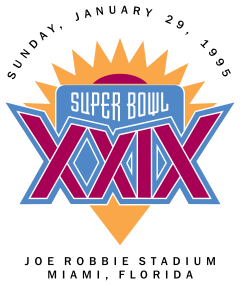
Back Super Bowl XXIX AST Super Bowl XXIX CEB Super Bowl XXIX Danish Super Bowl XXIX German Super Bowl XXIX Spanish Super Bowl XXIX French Super Bowl XXIX Croatian Super Bowl XXIX Hungarian Super Bowl XXIX Italian 第29回スーパーボウル Japanese
 | |||||||||||||||||||
| |||||||||||||||||||
| |||||||||||||||||||
| Date | January 29, 1995 | ||||||||||||||||||
|---|---|---|---|---|---|---|---|---|---|---|---|---|---|---|---|---|---|---|---|
| Stadium | Joe Robbie Stadium, Miami, Florida | ||||||||||||||||||
| MVP | Steve Young, quarterback | ||||||||||||||||||
| Favorite | 49ers by 18.5[1][2] | ||||||||||||||||||
| Referee | Jerry Markbreit | ||||||||||||||||||
| Attendance | 74,107[3] | ||||||||||||||||||
| Ceremonies | |||||||||||||||||||
| National anthem | Kathie Lee Gifford | ||||||||||||||||||
| Coin toss | Otto Graham, Joe Greene, Steve Largent, Ray Nitschke, Gale Sayers, Lee Roy Selmon and Kellen Winslow | ||||||||||||||||||
| Halftime show | Tony Bennett, Patti LaBelle, Arturo Sandoval and Miami Sound Machine | ||||||||||||||||||
| TV in the United States | |||||||||||||||||||
| Network | ABC | ||||||||||||||||||
| Announcers | Al Michaels, Frank Gifford, Dan Dierdorf, Lynn Swann and Lesley Visser | ||||||||||||||||||
| Nielsen ratings | 41.3 (est. 83.4 million viewers)[4] | ||||||||||||||||||
| Market share | 63 | ||||||||||||||||||
| Cost of 30-second commercial | $1.15 million | ||||||||||||||||||
| Radio in the United States | |||||||||||||||||||
| Network | CBS Radio | ||||||||||||||||||
| Announcers | Jack Buck and Hank Stram | ||||||||||||||||||
Super Bowl XXIX was an American football game between the American Football Conference (AFC) champion San Diego Chargers and the National Football Conference (NFC) champion San Francisco 49ers to decide the National Football League (NFL) champion for the 1994 season.[5] The 49ers defeated the Chargers by the score of 49–26, becoming the first team to win five Super Bowl championships. The game was played on January 29, 1995, at Joe Robbie Stadium in Miami, Florida.
This game is regarded as 49ers quarterback Steve Young's final leap out of the shadow of his predecessor, Joe Montana, who had won four Super Bowls with the 49ers (in 1981, 1984, 1988, and 1989), two with Young as the backup quarterback. With Young at the helm, and a defense consisting of several veteran free agents who joined the team during the previous offseason, San Francisco finished the regular season with a league-best 13–3 record, and led the league in total points scored (505). The Chargers, on the other hand, were regarded as a "Cinderella" team, and advanced to their first Super Bowl after posting an 11–5 regular-season record and overcoming halftime deficits in both of their playoff wins.
This was the first Super Bowl in which both teams scored in all four quarters. The combined aggregate score of 75 points and the ten total touchdowns both remain Super Bowl records. Still, the 49ers controlled most of the game, with Young completing touchdown passes in each of the 49ers' first two drives. The Chargers were able to cut the deficit late in the first quarter, 14–7, on a 13-play, 78-yard drive, but could not slow down San Francisco afterwards. Young was named the Super Bowl MVP, throwing a Super Bowl-record six touchdown passes, and completing 24 out of 36 passes for 325 yards.
Despite the predicted blowout (18 1⁄2- points is the second largest margin a team has been favored by in a Super Bowl), the fact that San Diego did not have as much national appeal nor a relatively large core fan base, and two teams from California playing, which could have significantly diminished interest along the East Coast, the telecast of the game on ABC still had a Nielsen rating of 41.3.[4]
- ^ DiNitto, Marcus (January 25, 2015). "Super Bowl Betting History – Underdogs on Recent Roll". Sporting News. Archived from the original on February 4, 2015. Retrieved February 4, 2015.
- ^ "Super Bowl History". Vegas Insider. Archived from the original on February 4, 2015. Retrieved February 4, 2015.
- ^ "Super Bowl Winners". National Football League. Archived from the original on January 1, 2016. Retrieved February 4, 2015.
- ^ a b "Historical Super Bowl Nielsen TV Ratings, 1967–2009 – Ratings". TVbytheNumbers. Archived from the original on February 8, 2010. Retrieved October 9, 2012.
- ^ Mascaro, Chris (February 2, 2010). "Super Bowl Trivia #7". Newsday. Archived from the original on May 12, 2018. Retrieved May 12, 2018.
What was the only Super Bowl between teams that played their home games in the same state? ... Super Bowl XXIX between San Diego and San Francisco. Buffalo and the [New York] Giants played in Super Bowl XXV, but the Giants play in New Jersey.